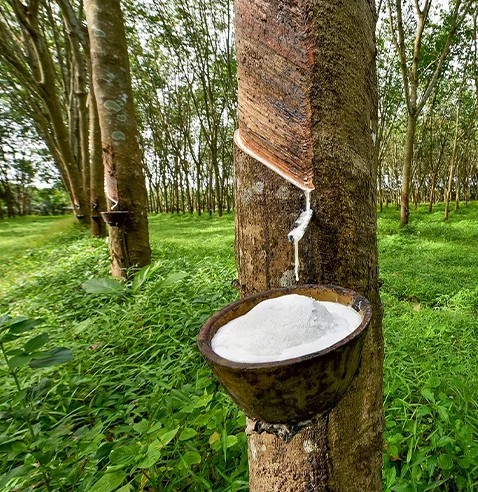The Chief Executive Officer of the Tree Crop Development Authority (TCDA), Andrews Osei Okrah has urged stakeholders in Ghana’s natural rubber industry to embrace compliance, traceability and value addition as key pillars for transforming the sector into a driver of economic growth.
The CEO whose speech, which was read on his behalf by the Deputy CEO In charge of Operations at the maiden Annual General Meeting (AGM) of Association of Natural Rubber Actors of Ghana (ANRAG) described rubber as one of Ghana’s six strategic tree crops with immense potential to generate foreign exchange, create jobs, and empower rural communities.
“Natural rubber goes far beyond tires. It plays a critical role in construction, pharmaceuticals, textiles and industrial products. The true wealth of rubber lies in finished goods, and Ghana must move into large-scale processing and manufacturing,” he stated.
Mr. Okrah highlighted the sector’s progress in attracting investment and innovation, but warned that market volatility, limited processing capacity, and the need for improved planting materials remained a major challenge.
He underscored the importance of compliance, stressing that registration, licensing, and the use of conveyor certificates and export permits issued by TCDA were mandatory for all actors.
“These measures are not bureaucracy. They are safeguards to protect farmers, secure fair trade, and uphold Ghana’s reputation worldwide,” he emphasised.
As part of efforts to expand production, the TCDA CEO announced that through the Ghana Tree Crop Diversification Project, TCDA will distribute over 100 million seedlings, including two million high-quality rubber seedlings, to farmers across the country.
This, he explained, will boost cultivation, strengthen farmer groups, and encourage sustainable agronomic practices.
Looking ahead, he said TCDA’s priority is to drive the industry beyond raw rubber exports into full-scale industrialisation.
“By scaling up downstream processing into tyres, gloves, adhesives, and medical products, Ghana can create thousands of jobs and position itself as a hub for rubber-based industry in West Africa,” he added.
Mr. Okrah also called for stronger partnerships among government, farmers, and industry players, noting that constructive dialogue between ANRAC and TCDA was essential for addressing challenges and sustaining progress.
“The rubber tree we plant today takes years to yield, but when it does, it sustains livelihoods for decades. The reforms we put in place now in compliance, research, investment, and industrialization will sustain Ghana’s prosperity for generations,” he concluded.
Delivering his welcome address, Emmanuel Akwasi Owusu, President of ANRAG, described the event as a “defining moment” for the country’s rubber industry, stressing that the formation of the association marked a bold demonstration of what unity of purpose can achieve.
“For many years, the voices of farmers, processors, traders, exporters, service providers, and allied stakeholders were scattered,” Mr Owusu said.
“Today, we gather under one umbrella, determined to chart a new path where our collective voice is heard, our interests safeguarded and our contributions to the national economy fully recognised,” he added.
He noted that while the sector continues to grapple with challenges such as pricing volatility, limited investment in processing, sustainability concerns, and compliance with emerging global regulations like the European Union Deforestation Regulation (EUDR), the opportunities are vast.
“These challenges also present opportunities – for value addition, export diversification, environmental stewardship, and wealth creation that touches every community where rubber is grown and processed,” he said.
Akwasi Owusu emphasised that ANRAG was founded to serve as a credible platform for advocacy, policy dialogue, and industry development.
The association, he said, would champion the welfare of smallholder farmers, attract investment into downstream industries, and strengthen sustainability and traceability measures to ensure Ghana’s rubber meets international standards.
“Our goal is not just to be a producer of natural rubber, but a competitive player on the global stage,” he declared. He commended the dedication and sacrifices of members and partners who had supported the establishment of ANRAG, describing their commitment as the foundation upon which the association would build.
Akwasi Owusu urged members to use the AGM as more than just a statutory exercise, but as an opportunity to reflect, refine strategies and lay a strong foundation for the future.
“Let our deliberations be guided by wisdom, unity, and a shared vision for a stronger, more sustainable, and globally competitive natural rubber industry in Ghana,” he said.
The AGM brought together key players in Ghana’s rubber value chain, with discussions expected to set the tone for industry reforms, policy engagement, and investment strategies in the years ahead.
Three Paramount chiefs namely Nana Kwesi Agyemang XI, Awulae Attibrukusu III and Awulae Angamatuo Gyan of Lower Dixcove, Lower Axim and Gwira respectively graced the maiden ANRAG AGM, which was on the theme “Strengthening Ghana Rubbers Value Chain Through Unity, Innovation and Sustainability”.









